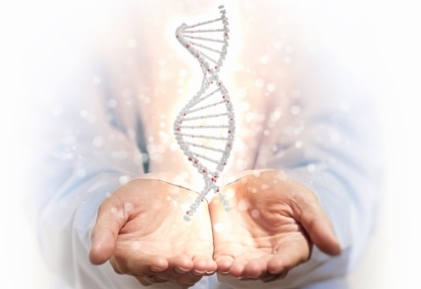Spotlight on: Epigenetics

The Biologist Vol 61(1) p32-33
Epigenetics is the study of any changes in gene activity not caused by changes in the DNA sequence.
Why is it important?
Epigenetics explains almost any change in DNA function that is not caused by a mutation. The 'epigenome' at its simplest is the cellular machinery that switches on or off certain genes, allowing stem cells to differentiate into all the cell types required to make a human being.
Adding methyl groups to DNA (DNA methylation) or modifying histones (the proteins that package DNA) are ways of changing how genes are expressed without changing the underlying DNA sequence. Although exquisitely complex, with one epigenetic change often causing a cascade of further epigenetic changes, researchers can now remodel the epigenome of organisms using these techniques and study the effects.
DNA was once thought to be an inflexible code that set out our phenotype from birth, but it is now known that the epigenome, operating above the level of the genome, can change how DNA is expressed throughout our lives, depending on all sorts of factors, such as our environment. As a result, epigenetics is of huge relevance to the study of both development and disease, especially cancer.
What careers are available?
Its huge potential as a medical treatment means that most epigenetics work is focused on biomedical research. Cancer epigenetics is probably the largest field, with hundreds of institutes worldwide looking to identify biomarkers of the disease and epigenetic drugs to treat it.
Huge sequencing programmes, such as the National Institutes of Health's 10 year Roadmap Epigenomics Project in the USA, are surveying epigenetic variation on a genome-wide scale, while smaller laboratories use this data to answer more specific questions about the mechanisms of disease.
There is a high demand for biologists with computational, bioinformatical or mathematical expertise to help process the vast amounts of data produced by epigenetic research. Medical doctors are increasingly moving into epigenetics research fields related to their disease speciality.
Where can I get more information?
- The Epigenetics Society (es.landesbioscience.com) is an international scientific organisation open to all those interested in the field. The EU-wide network EpiGeneSys.eu provides epigenetics news, research and events for scientists and interested members of the public.
- The Human Epigenome Project aims to map all the epigenetic variation found on the entire human genome and its website (epigenome.org) contains most of the data and publications from the project so far, as well as details of the contributing organisations.
- Johns Hopkins University (www.jhu.edu) is a world leader in epigenetics research, topping the list of citations for institutions in the field. In the UK, the Babraham Institute, Institute of Cancer Research and Wellcome Trust Sanger Institute join the many universities actively researching in this area.
 At a glance
At a glance
Name: Wolf Reik
Profession: Head of the epigenetics programme at the Babraham Institute in Cambridge
Interests: 'Epigenetic reprogramming', where epigenetic instructions are removed from a cell to revert it to an undifferentiated, or stem, cell.
What does epigenetically 'reprogramming' cells involve?
We work mostly with lab mice and all the cell types you can derive from them – like stem cells, liver cells etc. But the process actually happens in vivo, which is how we first came upon it. In normal development, say in germ cells or embryogenesis, there is an enormous removal of epigenetic information in many areas of the genome. In adults, different cells have a different epigenome which, for example, makes liver cells act like liver cells and brain cells act like brain cells. When you form an embryo you need to 'wipe the slate clean', meaning the cells afterwards have the potential to grow into any cell type needed.
What about the evidence that some epigenetic information is passed on to the next generation?
Large scale reprogramming happens and most epigenetic information is lost in the next generation, but it is possible that a small part of it survives. An interesting recent example is the study of mice and smell (Dias, B.G, Nature Neuroscience, 2013) where something that happened in the previous generation appears to have been passed on through inherited epigenetic information. It is controversial, but an interesting possibility.
What other research does the lab do?
A lot of people are starting to look at caste division in insects – at how the difference between workers and queens, who may be genetically identical, can be explained by epigenetic differences. We are particularly interested in a form of wasp that is 'primitively social' – that is, the caste is not fixed, is determined quite late, and you can't distinguish the queen from the workers just by looking at them. A new queen can emerge from the workers if you remove the queen. If castes are epigenetically determined, maybe you can reprogramme social behaviours by changing the epigenome.
What are some of the aims of this work?
Our work has led to a better way of making stem cells, and there are already epigenetic drugs that remodel the entire epigenome in cancer patients. I think in future we will have a more refined approach where we can manipulate specific parts of the genome epigenetically at will, when you see something has gone wrong with it.
How did you get into this research?
I'm a medical doctor, trained in Germany. I did a PhD with one of the pioneers in this area, Rudolf Jaenisch. I became fascinated by thinking about cell differentiation in an epigenetic way, before the field was even called epigenetics. I came to Cambridge and established my own lab, then started the epigenetics programme at Babraham. Epigenetics is really quite a large industry now, and it's been fantastic to see the subject grow.
What does the future hold for epigenetics?
There are very many big questions out there – quite basic biochemical ones, but also ones surrounding all the most common human diseases – diabetes, cancer, heart disease. How much is explained by genetics and the environment, and how does the epigenetic dark matter contribute in these diseases?
Is epigenetics ultimately about answering the 'nature vs. nurture' debate?
That's exactly how you can look at it, as an integrator between the genome and the environment. It's a good mental picture to use but it's important to know how much there is in that mental picture we don't know yet.


